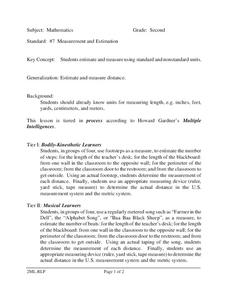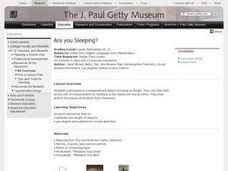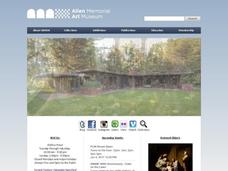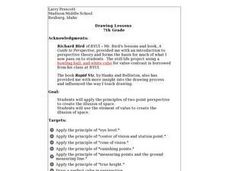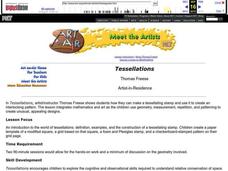Curated OER
Does it Measure Up?
Use this fun activity with youngsters learning how to use rules for measurement. Each is provided with six steps that direct them to draw specific things with specific heights or lengths. For example, they start by drawing a tree that is...
Curated OER
Candy Bar Measurements
Geometers explore mathematics by completing an object measurement worksheet. They utilize a variety of candy bars and rulers to conduct a measurement experiment in class. They complete worksheets as a group based on the measurement...
Curated OER
Rolling with Links
First graders explore geometry by completing a worksheet in class. In this non-standard measurement unit lesson, 1st graders discuss different techniques for measuring items without the use of a ruler. Students read several short stories...
Curated OER
Measurement and Estimation
Second graders explore estimation and measurement. In this estimation and measurement lesson, 2nd graders use footsteps to measure distances around the classroom. Students sing songs to measure the number of beats from one area to the...
Curated OER
Measurement: Inches
In this measurement worksheet, learners review the definition of an inch and use a ruler to measure the 7 objects to the nearest inch.
Curated OER
Are You Sleeping?
Here is a measurement lesson plan focusing on length. Learners use their feet as the unit of measurement for furniture in the classroom and at home, and sketch the pieces of furniture they measured.
Curated OER
How Do I Measure Up? (Intermediate)
Fifth graders compare the relationship between meter in music and measurement in math. They practice sightreading music by determining the number of beats per measure, clapping and counting the rhythm.
Curated OER
Measurements Around the Classroom
Third graders practice measuring items by examining classroom objects. In this geometry lesson plan, 3rd graders utilize measuring tools to find the weight, time, length or temperature of specific classroom items. Students...
Curated OER
Exploring Geometric Figures
Tenth graders explore mathematics by participating in hands-on daily activities. Learners identify a list of different shapes and classify them by shape, size, sides and vertices. They utilize tangrams and geometric pieces to gain...
Asian Art Museum
Create Your Own Samurai (Breastplate) Armor
Your class is going to love this activity. They get out their rulers, cardboard, and paints as they make Samurai breastplates. The simple art lesson lends itself to many different subjects such as, math/measurement, world history, and...
Curated OER
Weather Tools
Students explore Earth science by participating in a weather identification activity. In this scientific instrument instructional activity, students identify several weather related tools such as the weather vane, thermometer and rain...
Curated OER
Technology Lesson Activity: Fractions
Fifth graders practice using the English measuring system by creating fractions. In this parts of a whole instructional activity, 5th graders combine math key bars to simulate small parts of a bigger item. Students combine...
Curated OER
Chinese New Year: Paper Lanterns Lesson Plan
First graders examine a typical Chinese New Year celebration. As a class, they identify the traditions and values used and discuss how they are unique to China. To end the instructional activity, they take measurements to make their...
Curated OER
How to Figure Board Feet and Cost of a Board
Students investigate woodworking and converting lengths to cubic measurements. In this math conversions instructional activity, students examine the length of a piece of board, and its total area by using the formula for finding...
Curated OER
Chinese New Year: Paper Lanterns
First graders study the celebrations of Chinese New Year. They practice measuring and cutting to make paper lanterns.
Curated OER
Tiling Tessellations
Learners explore tessellations. In this shapes and geometry lesson, students describe the attributes of many of the shapes displayed on an Elmo. Learners create examples of tessellations using pattern blocks.
Teachers Network
A World of Symmetry: Math-Geometry
Define and identify the three basic forms of symmetry translation, rotation, and glides with your class. They cut out and arrange paper pattern blocks to illustrate symmetry, create a Cartesian graph, and design a rug with a symmetrical...
Curated OER
Exploring Biomes Lesson 4: Mapping Arizona
Once junior ecologists are familiar with Earth's major biomes, they hone in on Arizona's biomes. Using a website about Arizona's natural resources, learners will identify biotic communities. Beautiful maps and worksheets are provided for...
Curated OER
Exploring Optical Movement in Art
Students describe, represent and analyze patterns and relationships using shapes. They create simple geometric patterns. They demonstrate increasing technical ability and skill to complete visual arts assignments.
Curated OER
Drawing Lessons
Seventh graders complete a visual acts project that focuses on eye level, center of vision, station point, cone of vision, vanishing points, true height, and drawing a box in two point perspective. They work on a number of still life...
Curated OER
Radial Balance Geometric Shapes
Fifth graders create a radially balanced design using geometric shapes which exhibits their prior knowledge of symmetry. They use a kaleidoscope image to develop a design using markers or colored pencils.
Curated OER
How to Grow a Sunflower Plant
Students explore botany by conducting a sunflower growth experiment. In this plant life lesson, students identify the anatomy of a sunflower plant and the essential nutrients it requires to grow. Students utilize compost, soil, garden...
Pennsylvania Department of Education
Length and Perimeter
Third graders explore tessellations and the spatial concepts used in creating them. In this tessellations lesson plan, 3rd graders rotate, reflect and transform shapes to create tessellations. Students become familiar with...
Curated OER
Tessellations
Students learn and review basic geometric terms, definitions, and theory, including regular polygons, lines, angles, points, etc. They make a tessellating stamp and create a repeating work of art.



